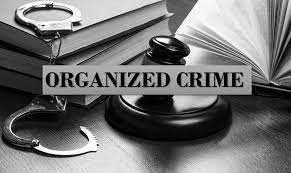Q. Discuss the types of organised crimes. Describe the linkages between terrorists and organised crime that exist at the national and transnational levels.
Ans:
Types of Organized Crimes:
Organized crime refers to criminal activities that are planned, coordinated, and executed by groups or networks of individuals for financial gain or power. Organized crime groups often operate across borders and engage in a variety of illegal activities.

Types of organized crimes
- Drug Trafficking: Organized crime groups are involved in the production, distribution, and trafficking of illegal drugs such as cocaine, heroin, methamphetamine, and synthetic drugs.
- Human Trafficking: Criminal networks engage in human trafficking for various purposes, including forced labor, sexual exploitation, and organ trafficking.
- Arms Smuggling: Organized crime groups illegally trade and traffic firearms, ammunition, and other weapons, often fueling conflicts and violence.
- Money Laundering: Criminal organizations use money laundering to legitimize their illicit gains by disguising the source of funds through legitimate businesses or financial transactions.
- Cybercrime: Organized cybercriminal groups engage in various online activities, including hacking, identity theft, online fraud, and data breaches.
- Extortion and Racketeering: Organized crime groups engage in extortion, blackmail, and racketeering, demanding money from individuals or businesses under threat.
- Illegal Gambling: Criminal organizations run illegal gambling operations, including casinos, sports betting, and online gambling.
- Smuggling: Organized crime is involved in smuggling contraband goods, including drugs, weapons, counterfeit goods, and wildlife products.
Linkages Between Terrorism and Organized Crime:
Linkages between terrorists and organized crime can exist at both the national and transnational levels, leading to complex and dangerous collaborations. These linkages may involve:
- Financing: Organized crime groups may provide funding to terrorist organizations through various illegal activities, such as drug trafficking, arms smuggling, or money laundering. These funds can support terrorist activities and help them maintain operational capabilities.
- Logistical Support: Organized crime networks can provide terrorists with logistical support, including safe houses, transportation, and forged documents, facilitating the movement of individuals and resources.
- Weapon Procurement: Criminal groups may supply terrorists with firearms, explosives, and other weapons, enabling them to carry out attacks.
- Training and Expertise: Organized crime networks may share their criminal expertise, such as bomb-making or smuggling techniques, with terrorist groups.
- Collaboration in Illegal Markets: Both terrorists and criminal organizations may collaborate in illegal markets, such as drug trafficking, where they can exploit existing networks and infrastructure.
- Use of Common Routes: Terrorists and criminal organizations may use similar routes and methods for smuggling and trafficking activities, taking advantage of established networks.
- Global Reach: Transnational criminal organizations and terrorist groups often operate across borders, making it easier for them to collaborate and share resources.
Efforts to counter the linkages between terrorism and organized crime require international cooperation, intelligence sharing, and comprehensive strategies that address both types of threats. Governments and law enforcement agencies need to work together to disrupt the financial flows, supply chains, and operational capabilities of both criminal organizations and terrorist groups to effectively combat this complex and evolving threat.
Thanks for reading the answer to the question: Discuss the types of organised crimes. Describe the linkages between terrorists and organised crime that exist at the national and transnational levels.